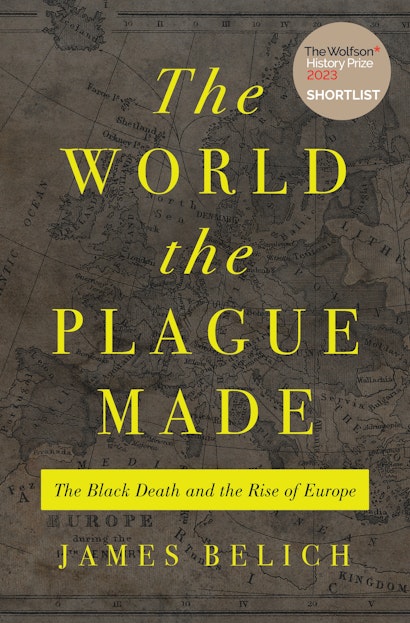In 1346, Europe and its neighbours were beset by a terrible plague, whose pathogen was Yersina Pestis. It halved populations, and repeat strikes prevented recovery for centuries. It came to be called ‘The Black Death’ and this lecture argues that it triggered Western Europe’s global expansion.
The lecture offers a new two-word answer to an old two-word question: Why Europe? Y. Pestis. The plague not only halved populations, but also doubled the per capita endowment of everything. For the first time, many Europeans had disposable incomes. Demand for silks, sugar, spices, furs, slaves and gold all grew. Soon after the Black Death, Europeans began reaching out beyond their own continent to meet these demands. To these motives for expansion, plague added the means. Labour scarcity drove more use of water-power, wind-power and gunpowder. Many technologies - water-powered blast furnaces, heavily-gunned galleons, musketry, eye-glasses - were ‘pressure-cooked’ into existence or florescence by plague, as was a new social formation, “crew culture”, which provided the manpower.
If plague had this effect in Europe, why didn’t the Middle East expand too - it also suffered from the Black Death? This lecture’s answer is that it did: Ottoman and Safavid empires also flourished after plague. Morocco, Oman, and the Mughals established colonial empires, at a distance from their homelands like those of Europe. Early modern “European” expansion was actually West Eurasian.
James Belich completed his doctorate at Nuffield College, Oxford, in 1982, while on a Rhodes Scholarship, before working as a historian and university lecturer in New Zealand. He was appointed to a personal chair at the University of Auckland in 1996 and then to the Inaugural Keith Sinclair Chair in History in 2002. He became Research Professor of History at the Stout Research Centre, Victoria University of Wellington, in 2008, and Beit Professor of Commonwealth and Imperial History at Oxford in 2011. He is a co-founder and former director of the Oxford Centre for Global History.
He was made an Officer of the New Zealand Order of Merit in 2006 for services to history, and his books have won six awards. The books include a two-volume history of New Zealand, Making Peoples and Paradise Reforged (1996 and 2001), and a comparative study of settler societies, Replenishing the Earth: The Settler Revolution and the Rise of the Anglo-world, 1783 -1939 (2009). His first book, The New Zealand Wars (1986), which began life as an Oxford doctoral thesis, was later made into a top-rating television documentary series. His latest book, The World the Plague Made: The Black Death and the Rise of Europe was published by Princeton University Press in July 2022.
The World the Plague Made is a panoramic history of how the bubonic plague revolutionized labour, trade, and technology and set the stage for Europe’s global expansion.
James Belich takes readers across centuries and continents to shed new light on one of history’s greatest paradoxes. Why did Europe’s dramatic rise begin in the wake of the Black Death? Belich shows how plague doubled the per capita endowment of everything even as it decimated the population. Many more people had disposable incomes. Demand grew for silks, sugar, spices, furs, gold, and slaves. Europe expanded to satisfy that demand—and plague provided the means. Labour scarcity drove more use of waterpower, wind power, and gunpowder. Technologies like water-powered blast furnaces, heavily gunned galleons, and musketry were fast-tracked by plague. A new “crew culture” of “disposable males” emerged to man the guns and galleons.
Setting the rise of Western Europe in global context, Belich demonstrates how the mighty empires of the Middle East and Russia also flourished after the plague, and how European expansion was deeply entangled with the Chinese and other peoples throughout the world.
